2025 Honorary Chairs / Padrinos de Honor

José Feliciano
Musician, Singer, and Composer
José Feliciano is recognized as the first Latin Artist to effectively cross over into the English music market, opening the doors for other artists who now play an important role in the American music industry. As importantly, Feliciano has been acclaimed by critics around the world as “The greatest living guitarist.” Referred to as “The Picasso of his Realm,” José Feliciano’s accomplishments are highly celebrated. He’s been awarded over forty-five Gold and Platinum records; he has won nineteen Grammy nominations, earning nine Grammy Awards, including the “LARAS Award for Lifetime Achievement.”
Born on September 10, 1945, in Lares, Puerto Rico to humble beginnings, the legendary singer, songwriter, and guitarist’s music bridges cultures and languages. One of 11 boys, blind from birth due to congenital glaucoma, Feliciano moved with his family to New York City at the age of five. There, in the cultural melting pot of the Bronx, he began his remarkable musical journey. He first experimented with sound using a tin cracker can and later a concertina, teaching himself by listening to records. By age nine, he was already performing at the Teatro Puerto Rico.
Feliciano eventually taught himself to play guitar, practicing up to 14 hours a day, developing a unique style that blended Latin, jazz, pop, soul, and rock elements. He began performing in Greenwich Village coffeehouses before expanding his performances across the U.S. In 1963, he signed with RCA Victor and released his first single, “Everybody Do the Click,” in 1964.
His breakthrough came in the 1960s, when he rose to international fame with soulful, bilingual interpretations of popular songs. His renditions of "California Dreamin’" and "Light My Fire" earned him widespread acclaim, and his original holiday classic “Feliz Navidad” became a global Christmas staple. Over the years, Feliciano has released dozens of albums, won nine Grammy Awards, and earned over forty-five Gold and Platinum records.
Beyond music, Feliciano is known for his advocacy and storytelling, as in his song “No Dogs Allowed,” which recounts being denied entry into the U.K. with his guide dog. He has performed at prestigious venues like the Newport Jazz Festival and contributed to film and television scores.
In his personal life, Feliciano has been married to Susan Omillian since 1982, with whom he has three children. He has been honored with an honorary degree from Sacred Heart University and was knighted by the Equestrian Order of the Holy Sepulchre, affirming both his cultural and humanitarian impact. José Feliciano’s musical career has been immortalized with a Star on Hollywood’s Walk of Fame while New York City honored him by re-naming Public School 155 in East Harlem, “The José Feliciano Performing Arts School.”
Guitar Player Magazine awarded him “Best Pop Guitarist,” placing him in their “Gallery of the Greats,” and he was voted both “Best Jazz” and “Best Rock Guitarist” in the Playboy Magazine reader’s poll, as well. In 1996, José was selected to receive Billboard Magazine’s “Lifetime Achievement Award.”
Continuing to be constantly in demand, José has performed for and with some of the most important people on Earth. He’s enjoyed playing with many of the top symphonic orchestras including the London Symphony, the Los Angeles Philharmonic and the Vienna Symphony Orchestra. He’s appeared on major television shows worldwide; he has done a number of his own specials and his music has been featured on television, in films and on the stage.
José Feliciano’s enduring legacy lies in his ability to connect people across borders through his heartfelt, transcendent music. Today, the National Anthem is rarely sung in its strictly traditional form, ever since José’s extraordinary performance in Detroit. In The Baseball Hall of Fame in Cooperstown, New York, you can actually listen to this historic moment when José first sang the National Anthem and caught the world’s attention off-guard!
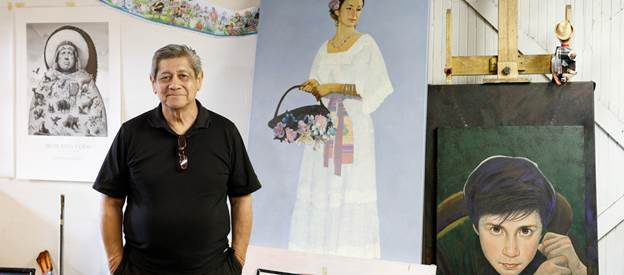
Ignacio Gomez: Chicano Visual Artist and Muralist
Born in Boyle Heights, California in 1941, Ignacio Gomez has had a long and important career as an artist and muralist. His vast collection of posters aiming towards the youth in the community, to strive for the highest in education, have become a positive enforcement to many.
Gomez had early success in 1978 with his painting of Edward James Olmos as the character “El Pachuco”. This has since become his most famous poster which was used to promote the Luis Valdez play “Zoot Suit”, the first Chicano play on Broadway which debuted in 1979. The “Zoot Suit” image is now in the collection of the Smithsonian American Art Museum.
The production’s poster—an image that not only captured the spirit of the play but which has also become an iconic symbol of Chicano/Latino pride. According to Gomez, that image would have turned out far less iconic had he not been willing to lay his own money and reputation down on the line. Somebody at the Mark Taper Forum had seen a cover I did for New West Magazine and called me and asked, ‘Are you Ignacio Gomez?’ I said, ‘Yes.’ ‘Are you a Chicano?’ ‘Yes.’ ‘Have you heard of the play Zoot Suit?’ ‘Yes.’ ‘We want you to do the poster for the upcoming season,’” says Gomez. “I said, ‘Great’ and I got all excited.”
“But then they said, ‘We can only pay you $300 and we can only afford two colors: yellow and black,’” adds Gomez, with a laugh. “I told them, ‘No, it’s gotta be full color, even if I have to pay for it.’ Imelda, my wife, who was nearby holding one of my kids, heard me say that and her mouth dropped.”
Fortunately for art history, his offer spurred the Mark Taper into action. Not only were they able to renegotiate with their printer to do full-color printing, but they also upped his pay to $500, and let Gomez retain the image’s copyright.
In a short autobiographical piece from 2002, Gomez talked about his early career doing technical illustrations, time in the Army Reserves, and education at Los Angeles Technical College and Art Center College of Design in Pasadena. “My uncle and my older brother were painters,” Gomez continued. “I was fortunate to have them as my art mentors. They showed me different murals of Diego Rivera and paintings of El Greco from Spain, and Norman Rockwell art.”
Ignacio has worked on various motion picture posters and advertising campaigns. Some of which are now in corporate collections.
In 2004, Ignacio designed, sculpted, and painted the Cesar E. Chavez Memorial for the City of San Fernando, California, honoring the late Chicano labor leader and founder of the United Farm Workers. As he reflected, “I hope [the Chavez Memorial] has the same impact on the new generations that Cesar had on us and that they learn about the struggles he fought for.” That same year, he also designed the Cesar E. Chavez’ headstone in La Paz, Keene, California.
In 2012, President Barack Obama dedicated the gravesite and the Cesar E. Chavez Center into the Cesar E. Chavez National Monument. In 2013, another Cesar E. Chavez Monument was designed and sculpted by Ignacio which was unveiled in city of Riverside, California.
Gomez also designed the statues for Mendez Tribute Monument Park in Westminster, CA, which opened in 2022. The monument commemorates the landmark Mendez v. Westminster civil rights case of 1947 about school segregation.
In 2023, Gomez’s work was part of the Estampas de la Raza exhibition of Mexican and Latino art at the Delaware Art Museum.
Most recently, Ignacio sculpted a life-size figure of Cheech Marin (LEAD Summit 2020-22 Honorary Chair / Padrino de Honor) for the Cheech Museum in Riverside California. Ignacio also has his work in the Lucas Museum, LACMA, and the Autry Museum.

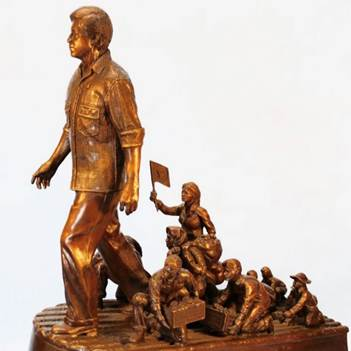
Previous Honorees
2010 Inaugural LEAD Summit Madrina de Honor
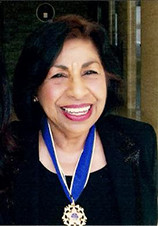
Sylvia Mendez
Sylvia Mendez is the oldest daughter of Gonzalo Mendez, a Mexican immigrant, and Felicitas Mendez, a Puerto Rican, who fought so she and her brothers could have equal education through the case of Mendez et al v. Westminster et al. Sylvia continues with the legacy left by her parents to campaign for education.
Sylvia Mendez worked for 33 years as a nurse at the USC Medical Center in Los Angeles. Ms. Mendez spends her retirement traveling abroad and speaking at universities, conferences and schools across the nation. Her sole intent is to convey the importance of obtaining an education by encouraging students to stay in school.
2011 LEAD Summit Madrina de Honor

Judy Rodriguez Watson
Judy Rodriguez Watson, co-president of the Seal Beach-based Watson and Associates Development Corporation and ardent supporter of education, is the Honorary Chair of the LEAD 2011summit.
Affectionately termed, “La Madrina de Honor” of the second annual conference, Rodriguez Watson together with her husband James Watson, co-chaired California State University, San Bernardino’s “Tools for Education” fund-raising campaign in 2006. The effort raised more than $3 million to equip the university’s College of Education Building with technology labs, clinics, literacy and assessment centers that will serve the students and the Inland Empire community.
In 2010, CSUSB named its four-year-old public art program the Judy Rodriguez Watson Public Art Project in honor of her passion and financial support for placing art in open spaces at CSUSB, the surrounding community and around the city of San Bernardino.
2011 Inaugural Feria Educativa Padrinos de Honor
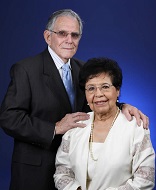
Graciano (†) & Trini Gomez
Mr. and Mrs. Graciano and Trini Gomez graciously accepted to serve as our 2011 Honorary Chairs for the inaugural LEAD Feria Educativa. They will be affectionately known as our event's 'padrino y madrina de honor'.
Married for more than 30 years, Graciano and Trini are very well known, have deep roots, and are highly active in and across our regional communities. They place a high value on education and socio-economic endeavors, and in the collaboration of community groups working towards mutual goals and objectives. They are most well known for their hard work and commitment in having established the Inland Empire Hispanic News.
Since the publication's inception, Mrs. Trini Gomez has played a vital role in the development and ongoing operation of the newspaper, alongside Graciano, who served as publisher and editor. Together they have made into reality this dream of creating such an elemental resource for our communities across the region.
The Inland Empire Hispanic News has been one of the primary newspapers to bring to light important public and social policies in regards to health, education, economic development, and business news. It captures the spirit of the greater Inland Empire community by sharing the inspirational stories of outstanding role models of leaders in the community, business, education, and non-profit sectors, and individuals and families who are making positive contributions.
2012 LEAD Summit Padrino de Honor
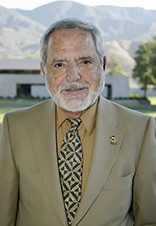
Dr. Ernest F. Garcia (†)
Ernie Garcia served as dean of Cal State San Bernardino's College of Education for more than a decade during the 1980s.
Garcia retired in 1990 and lives in San Bernardino, was named the LEAD 2012 honorary chair, or 'el padrino de honor.' He spent 36 years in education, including 13 as a teacher and an administrator in K-12 schools and 23 years in higher education that included 11 years as the dean of the CSUSB College of Education, where he also served as a professor and chair in the department of elementary education.
Garcia's educational career also included serving as an associate professor of elementary education at the University of Redlands and teaching part time and during summers at the University of Redlands, Stanford University, UC Santa Barbara, UC Riverside and San Bernardino Valley College. Garcia served on the board of the Rialto Unified School District for nine years; later, an elementary school was named in his honor. He received the Career Achievement Award from the University of Redlands Alumni Association and was recognized as one of 'Forty Who Made a Difference' by the UCR Alumni Association on the occasion of UCR's 40th
anniversary. He was named to the Alumni Hall of Fame by San Bernardino Valley College and received the 'El Fuego Nuevo' award from the Association of Mexican-American Educators, where he served as state president.
2013 LEAD Summit Madrina de Honor
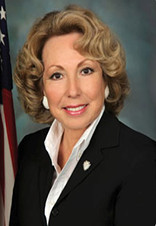
Honorable Josie Gonzales
Josie Gonzales proudly serves as Supervisor for San Bernardino County's 5th District.
Supervisor Gonzales continues to champion issues important to our communities, including public safety, economic development, improved transportation, ending chronic homelessness, and environmental stewardship. She addresses these key issues through cooperative efforts developed on federal, state and local levels.
In effort to improve the wellbeing of county families, Supervisor Gonzales initiated a county wide Healthy Communities campaign. To date, 16 cities and towns throughout the county have adopted innovative Healthy Cities programs that encourage residents to make healthy lifestyle choices.
Prior to her service as a member of the Board, Supervisor Gonzales served on the Fontana City Council, and the City's Planning Commission. The San Bernardino County native has also owned and operated a successful small business in the city of Fontana.
2014 LEAD Summit Padrino de Honor
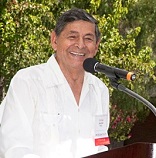
Dr. Julian Nava (†)
It's with great pleasure and excitement that we announce Dr. Julian Nava as Honorary Chair / Padrino de Honor for our LEAD Summit 2014.
Nava is a recognized Latino leader and role model in the United States. The son of Mexican immigrants, he was raised in East L.A. and says even through junior high, he was still learning English as Spanish was spoken at home. He struggled in high school and joined the Navy as soon as he legally could at age 17 during World War II.
After his service, he attended East Los Angeles Community College before transferring to Pomona as a junior. He graduated with a degree in history and then earned his doctorate in Latin American history from Harvard University.
Nava was a civil rights activist during the height of the Chicano Movement. He was the first Mexican-American to be elected to the school board of the L.A. Unified School District in 1967.
In 1993, Nava was one of the pallbearers selected for the funeral of the labor leader Cesar Chavez. Nava worked with Chavez since his time with the Community Service Organization in Los Angeles immediately after the Second World War.
He taught history at California State University at Northridge from 1957 to 2000.
In the 2006 HBO film Walkout, the role of Dr. Julian Nava was played by director Edward James Olmos.
Most notably, in 1980 Nava was the first Mexican-American to be appointed the U.S. Ambassador to Mexico by then President Jimmy Carter. He is the author of several history books, as well as a memoir, Julian Nava: My Mexican-American Journey (2002).
Today he is retired and lives San Diego County with his wife, Patricia. He holds the title of professor emeritus of history at CSUN. Nava lectures widely about multicultural education, and serves on the board of directors of Encuentros, which promotes education among young Hispanic males. In 2011, a school was named for him.
2015 LEAD Summit Padrinos de Honor
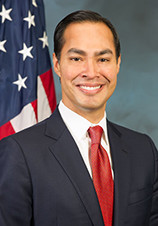
Secretary Julián Castro
Julián Castro was sworn in as the 16th Secretary of the U.S. Department of Housing and Urban Development on July 28, 2014. In this role, Castro oversees 8,000 employees and a budget of $46 billion, using a performance-driven approach to achieve the Department's mission of expanding opportunity for all Americans
'Julián is a proven leader, a champion for safe, affordable housing and strong, sustainable neighborhoods,' said President Barack Obama after Castro's confirmation. 'I know that together with the dedicated professionals at HUD, Julián will help build on the progress we've made battling back from the Great Recession - rebuilding our housing market, reducing homelessness among veterans, and connecting neighborhoods with good schools and good jobs that help our citizens succeed.'
Before HUD, Castro served as Mayor of the City of San Antonio. During his tenure, he became known as a national leader in urban development. In 2010, the City launched the 'Decade of Downtown', an initiative to spark investment in San Antonio's center city and older neighborhoods. This effort has attracted $350 million in private sector investment, which will produce more than 2400 housing units by the end of 2014.
In March 2010, Castro was named to the World Economic Forum's list of Young Global Leaders. Later that year, Time magazine placed him on its '40 under 40' list of rising stars in American politics.
Previously, Castro served as a member of the San Antonio City Council. He is also an attorney and worked at Akin, Gump, Strauss, Hauer & Feld before starting his own practice.
Secretary Castro received a B.A. from Stanford University in 1996, and a J.D. from Harvard Law School in 2000. He and his wife, Erica, have a daughter, Carina and a son, Cristian.
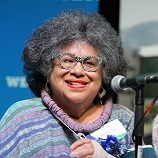
Dr. Ellen Riojas Clark
Ellen Riojas Clark, Professor of Bilingual Education, holds a Ph. D. in Curriculum and Instruction from The University of Texas at Austin. She received a M. A. in Bicultural Bilingual Studies from The University of Texas at San Antonio and a B. A. in Elementary Education and Early Childhood Education from Trinity University.
Dr. Clark served as the Educational Content Director for a nationally acclaimed Scholastic Entertainment PBS children's cartoon series. This sixty-five episode program Maya and Miguel is focused on promoting the value of a culturally diverse society and bilingualism.
Other creative activities include the writing of book reviews and travel articles for the general public in the local newspaper. These reviews with the byline of Las Dos Abuelas and Abuela Ellen/Maria travels to… have generated great interest, provoke intellectual challenge and discussion, and most importantly, interest in reading. Teachers use the articles to promote cultural literacy and to stimulate reading with their students.
Dr. Clark has developed and presented many graduate summer institutes that focused on Latino literature and culture, multicultural education collaborative approaches, curriculum development, cooperative learning and restructuring schools for language minority students at UTSA over the years. These have included the 1999, 2001, 2003 National Endowment for the Humanities summer institutes Derrumbando Fronteras/ Breaking Boundaries: the Inclusion of Mexican American and Latino Literature and Culture in the Classroom for which she received major NEH funding. Other signature events that she has co-chaired were: the University Conference on Multiculturalism in the United States: Multiculturalism and Democracy: Strategic Alternatives that brought speakers such as Carlos Cortes, Arthur Schlesinger, Jr., Cornel West, and Jorge Klor de Alva and Luz: Education through Art - Orlando AB. This event included an art exhibit, workshops, and student programs structured in collaboration with the Columbian artist, Orlando Botero, traveled nationally and internationally.

Vicki Carr
A legendary star of the stage and screen Vikki Carr has captivated audiences nationally and abroad for over 50 years with her melodic voice and presence. She is one of the best loved and most accomplished entertainers in the United States, Latin America and Europe. In her illustrious career she has garnered four Grammy Awards including a Lifetime Achievement Award from the Recording Academy and has released over 60 best selling recordings. She has performed for the Queen of England, five United States Presidents, wartime soldiers in Vietnam and sold out audiences around the world. She has worked in radio, television, film and theater. Her music embraces four languages and she is among the first artists to bridge the cultures of the United States and Latin America, paving the way for many performers today.
Born Florencia Bisenta de Casillas Martinez Cardona in El Paso, Texas and raised in Southern California, the eldest of seven children, who would later change her name to Vikki Carr, began performing at the age of four singing Adeste Fidelis in Latin at a Christmas program. She was signed to a contract with Liberty Records in 1961. She recorded He ‘s A Rebel, which first became a hit in Australia. That title was soon followed by the unforgettable release, It Must Be Him, which charged up the charts in England. One year later, the single was released in the United States and earned Carr three Grammy Award nominations. The international hit emerged again when she and the song were featured in the storyline of the Academy Award winning movie Moonstruck. After It Must Be Him came a string of hits including With Pen In Hand, for which she received her fourth Grammy Award nomination, The Lesson, Can’t Take My Eyes Off of You and For Once in My Life.
Vikki Carr has received many prestigious awards throughout her career. In addition to the 2008 Grammy Lifetime Achievement Award, these honors include the 2011 Medallion of Excellence given by the Congressional Hispanic Caucus Institute, 2009 Vietnam Veterans President’s Award, 2005 National Hispanic Media Coalition Impact Lifetime Achievement Award, 2003 Latino Spirit Award, 2003 Tito Guizar Award, 2002 Trefoil Award, 2000 Inductee, Latino Legends Hall of Fame, 1998 Imagen Foundation “Humanitarian Award, 1996 Hispanic Heritage Award, 1991 Girl Scouts of America Trefoil Award, 1990 City of Hope’s Founder of Hope Award, 1988 Nosotros Golden Eagle Award, 1984 Hispanic Woman of the Year, 1981 Star on the Hollywood Walk of Fame, 1974 Doctorate in Law from San Diego University and Doctorate in Fine Arts from St. Edwards University, 1972 American Guild of Variety Artist’s “Entertainer of the Year”, and the Los Angeles Times’ highly respected “Woman of the Year” for 1970. She has earned the career achievement award of the Association of Hispanic Critics, Chicago’s Ovation Award and the YWCA Silver Achievement Award.
As a humanitarian, Carr’s list of accomplishments is equally as impressive. Her commitment to education and leadership development for Latino youth extends throughout her career. Vikki established the Vikki Carr Scholarship Foundation in 1971 in California. Now based in Texas, the program offers scholarships to Latino students in Texas who wish to pursue their dreams of a college education. For the past 42 years more than 300 scholarships totaling over $350,000 have been awarded to students attending the Nation’s leading Universities. Former VCSF recipients include a Superior Court Judge, the first Mexican-American Astronaut, Doctors, Attorneys and Teachers. With the majority of the recipients returning to their childhood communities to give back. Carr held benefit concerts to support Holy Cross High School in San Antonio for over 20 years. Her philanthropic support has also extended beyond the Latino community to many health related charities, several which benefit children and families. Serving for two years as chairperson of The American Lung Association, Carr was at the forefront of the anti-smoking campaign. St. Jude, The American Heart Association and The National Breast Cancer Foundation are just a few of the many organizations Carr has supported. In 2011 she was an “ambassador of hope” for children in San Pedro Sula, Honduras as she performed at a fund-raising event for Fundacion Amigos de Guarderia Infantiles.
2015 Feria Educativa Padrinos de Honor
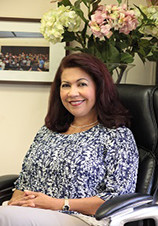
Lilian Esther Hernandez
Ms. Lilian Esther Hernandez is the Executive Director for PIQE’s regional offices in Riverside/San Bernardino and San Gabriel Valley. She is responsible for the programs day to day operations, program development, quality control and the fiscal budget for the offices. In addition, Ms. Hernández is responsible for establishing and maintaining working relationships with local university presidents, community leaders, school superintendents, principals, and other school representatives. Ms. Hernandez was instrumental in successfully leading and sustaining the two regional offices for the past nine years. She was essential in expanding PIQE’s programs in the counties of Riverside, San Bernardino and a portion of Los Angeles. She was responsible for making sure we served multiple communities by offering PIQE’s programs in multiple languages. She joined PIQE in 1999 as a Facilitator, and then, as an Associate Director before being promoted to Executive Director.
Ms. Hernández was born and raised in Puerto Cortes, Honduras. She immigrated to the United States in 1982. She and her husband are pastors in Amistad Cristiana Church of Assemblies of God in the city of Upland. She has tremendous passion for helping others and through her involvement she has participated in numerous conventions empowering women to overcome obstacles. She is a gifted speaker being invited to lead workshops in Mexico, Cuba, Honduras, and El Salvador. In addition, she enjoys volunteering in orphanages and helping children in need. She is a proud mother of two grown children: Caleb and Joshua Hernandez.
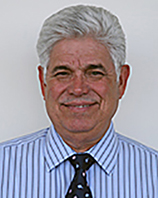
Jorge B. Haynes
Jorge B. Haynes was Senior Director of External Relations for the California State University Office of the Chancellor. He was responsible for outreach to all California State University constituent groups and serves as the primary liaison between the Chancellor's Office and underrepresented communities in California and nationally.
Haynes coordinated the CSU's out-of-the-box initiatives, which have been nationally recognized and replicated in other states. The CSU's partnerships with African American churches, Latino organizations, Asian Pacific Islander representatives and Native American communities have created new pathways to underscore the need for academic preparation leading to a university education for traditionally underrepresented communities.
Prior to joining the Chancellor's Office in 2001, Haynes worked in the capital cities of California, Florida, Texas and Washington, D.C. While in California, he worked in the Department of Finance, the Public Employment Relations Board, the California Department of Transportation (CalTrans) and the California State Assembly where he was the first Latino hired as a consultant to the Assembly Education Committee. Haynes is an Air Force Vietnam veteran and is active with the American Legion, the G.I. Forum, the League of United Latin American Citizens (LULAC), the Hispanic Association of Colleges & Universities (HACU) and the Hispanic Chambers of Commerce. He received his BA in government from CSU Sacramento in 1972.
2016 LEAD Summit Padrino de Honor
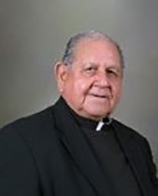
Fr. Patrick S. Guillen (†), Chicano Priest
& Co-Founder of Libreria Del Pueblo
Patricio Guillen Santoyo was born in 1929 in Bellflower, California, and the eighth child of ten born to Patricio Guillen Zendejas from Michoacan and Juana Santoya Castorena from Aguascalientes, Mexico. Both of his parents immigrated to the United States at the turn of the 20th Century.
Just 8 months after he was born, the Great Depression of 1929 shook the economy and his family soon lost both their dry farm and family home in Bellflower. To make matters worse the Long Beach earthquake of 1932 hit the area badly and they spent several days living outdoors until the after-shocks lessened in intensity and finally stopped completely.
From 1932 on, his family became one of the thousands of migrant Mexican American farm working families barely earning enough for food and lodging. As the Depression intensified, 4 of his siblings and 15 of his cousins all began to die in their teen years due to the great Tuberculosis Epidemic that struck with deadly force.
Patricio graduated from Chino High School in 1948, attended both La Verne College and Immaculate Heart Major Seminary and graduated in 1957 with his Bachelor’s degree. He was ordained a Roman Catholic Priest on March 19, 1957 (Diocese of San Diego, CA).
Fr. Guillen recounts in his written essay “THE JOURNEY OF A CHICANO PRIEST” (2011) that he began his priestly, pastoral ministry right after his ordination in St. Joseph’s Cathedral, and as he lay flat on the floor of the Sanctuary during the chanting of the litany of the Saints he “offered his life to God in the service of His People.” Little did he know then what lay ahead in his five-year priestly ministry as an associate pastor, two years as a catholic Chaplain of Narcotic Rehabilitation Center, and three years of Post Graduate Studies, Diocesan Ministries and Pastor of four different parishes.
The Civil Rights movement of the late 1950’s and 60’s was emerging more strongly each day, as he wrote “There was too little time to focus on the social issues that we were facing. Even after Vatican II the people found it difficult to move beyond traditional form of Catholicism-Mass and the sacraments.” Two of the most consoling experiences were supporting the campesinos under Cesar Chavez, and the other was the founding of PADRES (the National Association of Chicano Priests). But it was Hispanic Ministry that began to broaden the scope of pastoral ministry, forming Comunidades de Base and establishing a school of ministry for the formation of lay leadership in the areas of Catechetics, Evangelization, Liturgy and Social Action.
It was in October of 1986 he began to work with friends who were committed to organize the community and together they formed and founded Libreria Del Pueblo, Inc (LDP) a community-based non-profit organization with a 501 (c) (3) status.
Fr. Guillen recounts, “Too often we neglect to read the Bible, carefully under the historical context of the Historical Jesus and his Liberating practice. I can truly say that my experience in the Hierarchical Institutional Church has been a very limited ministry. In a way I can say that since I was allowed the opportunity to work for PADRES and for Libreria Del Pueblo Inc., an entirely new exciting ministry has opened up for me. Little did I dream that I would thank God for allowing me to work outside of the institutional Catholic Parish Ministry.”
For 30 years now, LDP has primarily focused on improving the lives of Latinos who reside in the counties of San Bernardino and Riverside. LDP has been serving the community by providing health, educational, citizenship classes and social services with a focus on the immigrant community.
LDP is strategically located in the heart of the city of San Bernardino's poorest barrios 'The West side.' For three decades the organization has quietly gone about its work sowing seeds of life and hope for some of the poorest and neediest of those in the community: victims of domestic violence, farm workers, undocumented individuals and juveniles.
A Catholic priest for nearly 60 years, Fr. Guillen served as executive director of LDP until stepping down from his role a few years ago under the advice of his physician. At the celebration of LDP’s 25-year anniversary, Fr. Guillen shared “I realize how my entire life as a child with my migrant parents, my years of poverty, hunger and homelessness and deaths have provided me with compassion, patience and love for those whom we daily serve. The opportunities I have had to educate myself and the desire and the need to continue learning has helped me not fall into that dreaded routine that leads to a conservatism that destroys the spirit of creativity and freedom that we need as wings to always look ahead and beyond, not only backwards where we have been.”On behalf of the LEAD Organization, we are truly honored that he has accepted to serve as our Padrino de Honor as he is among those we consider a community giant and pillar who has contributed in the fields of education, civil rights, justice for human rights, preserving the arts, journalism, youth leadership development and political awareness.
2017 LEAD Summit Padrinos de Honor
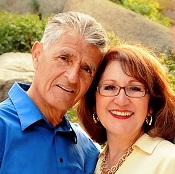
Frank and Eloise Reyes Biographies
Assemblymember Eloise Gomez Reyes was born and raised in Colton, attended Colton High School and San Bernardino Valley College, eventually transferring to USC. She worked up to three jobs while she worked her way through college. She received her law degree from Loyola Law School and not long after, became the first Latina to open her own law office in the Inland Empire.
As a 12-year-old Eloise struggled alongside her family, working every summer in the fields picking onions and grapes. She worked hard to earn money to pay for her school clothes, but this early experience provided the strong work ethic that defines her today. “This work helped me to appreciate the work of so many others who, even today, must work long and hard hours to support their family.”
Eloise’s volunteer work and leadership in the community started long before she became an attorney –she started a youth drill team in Colton when she was 16 and volunteered with in-school scouting and taught Catechism.
She learned early in her life that her passion was to help others and she knew that as an attorney, she could help those who needed protection and assistance.
Before her recent election to the California Assembly, Eloise spent her legal career helping injured workers. Her private practice includes workers’ compensation and personal injury. In addition to her very busy practice, Eloise unselfishly dedicated much time, treasures, and talents to helping the indigent. She was a member of the Inland Empire Latino Lawyers Association, which has Legal Aid Clinics in the Inland Empire, where she volunteered for over 30 years. Recently, Eloise was named Attorney of the Year for her unequaled hours of volunteer work.
Most recently, Eloise was an Adjunct Professor at Cal Poly Pomona teaching Ethnic Identity: Latin@s, Politics, and Law.
Eloise was a co-founder of the Inland Empire Community Health Center in Bloomington and was active on many Boards including the Children’s’ Spine Foundation, Inland Empire Latino Lawyers Assoc., SBVC Foundation Board, The Brightest Star Foundation (for foster youth), and the National Orange Show Board of Directors. Eloise was also commissioned for a five-year term as an advocate with the Mexican Consulate for San Bernardino, California.
Eloise has received countless awards and honors over the years including Community College League of California Distinguished Alumna, the Barbara Jordan Award for Leadership, SBVC 75th Anniversary Distinguished Alumna Award, Democrat of the Year 2015, Community Hero Against Gun Violence Award, and the Imagen Foundation Award.
Since becoming our newest Assemblymember, Eloise was appointed Chair of the Assembly Legislative Ethics Committee and was also appointed to the Special Committee on the Confirmation of Xavier Becerra as Attorney General. Additionally, she has been appointed to various important Committees: Appropriations, Judiciary, Labor, Privacy and Utilities and Energy.
Eloise’s passion and commitment to the community will bring resources and opportunities to San Bernardino county. She will continue to be a leader –fighting alongside those who seek a better community and a better world.
College Trustee Frank G. Reyes was elected to the San Bernardino Community College District Board of Trustees, Area 1 in the most recent election. Frank has been an advocate for higher education and will continue to expand opportunities for our students.
Recognizing the importance of education, Frank shares, “A quality education is the best gift we can give our students and they all deserve the opportunity to learn in a safe and stimulating environment.”
Frank’s passion for the San Bernardino Community College District (SBCCD) includes many years working for our students, faculty and staff.
Frank received his Bachelor of Arts from California State University, San Bernardino in Spanish (minor: Business Administration). He continued his education at CSUSB and received his Master of Arts in Counseling (with Pupil Personnel Credential). In addition to various other credentials, Frank enrolled at Nova University and completed his EdD coursework (short of his dissertation).
Although Frank began his professional career at CSUSB as the Outreach Coordinator for the EOP Program, he completed his career working for the San Bernardino Community College District (SBCCD). Frank worked at San Bernardino Valley College, Crafton Hills College and the SBCCD for 33 years in various capacities including Professor with EOPS Program, Counselor, Head of Counseling Department, Community Services Administrator and Associate Vice Chancellor Governmental Affairs.
During his final 12 years in Governmental Affairs, Frank had the honor of working with colleagues and elected officials, receiving over $120 million in federal grants (Departments of Education, Commerce, Labor, Defense, FEMA and others); and the only grant in the Western U.S. for Nanotechnology. He saw the needs, sought the appropriate funds and succeeded. SBCCD was considered a top recipient of federal grants in California.
Frank has received many awards for his work. The Hispanic Association of Colleges and Universities, an international organization, recognized Frank with the P. Gus Cardenas Award for his leadership in higher education, Most Influential Governmental Advocate of the Year, selected as one of 15 to represent the U.S in Spain because of his leadership, traveled to China with a select group on business and educational exchange and was part of the Department of Defense/HACU Leadership Council on Higher Education.
In addition to his work with the SBCCD, he was also the Executive Director for the Arrowhead Regional Medical Center Foundation where he served for 3 years.
Frank understands how the system works and will work to bring the funds back to the students. Frank will continue to work with those committed to the students, faculty, staff and community.
Often referred to as the “Power Couple,” Frank and Eloise have been married for 36 years. They have a son, Kristofer, who is a college student.
2018 LEAD Summit Madrinas de Honor
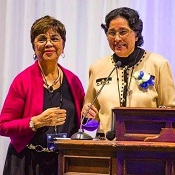
Gloria Macías Harrison and Marta Macías Brown (†) (sisters), are San Bernardino natives (both graduates of SB High School), civic advocates, and lifelong activists who among many achievements and decades' work in community rights, education and politics; are credited for helping create and grow the “El Chicano” newspaper. It was founded in 1968 under the auspices of the University of California, Riverside, by a group of community leaders from San Bernardino and Riverside counties.
Marta was one of two first editors of the volunteer-driven paper which served as a voice and educational platform for the Chicano community. Articles focused on social justice, civil rights, school integration and other issues. It became part of the Chicano Press Association, an organization of like newspapers and newsletters around the country, and served as an organizing tool for voter registration, rallies, meetings and political campaigns.
Gloria and her husband, Bill Harrison, were active in the Progressive Action League advocating for equal access to education, housing, and employment opportunities. In 1969, “El Chicano” came under independent ownership with Marta as editor, Gloria as publisher, and Bill as its business manager.
Next year (2018), 'El Chicano', which publishes weekly along with nine other community weeklies that make up the family publishing business, Inland Empire Community Newspapers, will turn 50, and is already the longest-running Chicano-owned and -operated publication in state history!!!
Gloria Macías Harrison served as President of Crafton Hills College for 12 years and as Vice President of Instruction for six. She taught for 20 years at San Bernardino Valley College and was Dean of Humanities for three. She retired in 2011 and was elected to the San Bernardino Community College Board of Trustees in 2012.
In addition to serving on the city's Charter Committee, Macías Harrison is a member of Kiwanis and is on the Board of the Valley Concert Association, the Brown Legacy, Crafton Hills Foundation, KVCR Education Foundation, San Bernardino Valley College Foundation and is currently a member of the League of Women Voters, the American Association of University Women, and the Rialto Business and Professional Women. She serves on several advisory committees including the San Bernardino City Schools' Making Hope Happen and is Treasurer of the San Bernardino County School Board Association. As past President for the Community Foundation, she is active on the Foundation's Youth Grant Makers Program.
Marta Macías Brown was also a founding member of the first United Mexican American Student chapter, a precursor to the Movimiento Estudiantil Chican@ de Aztlán, or MEChA, at California State University, San Bernardino. MEChA, which sought Chicano empowerment and unity through political action, sprang from the civil rights and Chicano Movement sweeping through Southern California and elsewhere around the country during the 1960s.
Macías Brown’s career includes local coordination of the Robert Kennedy campaign, and assistance organizing regional interaction with farm workers’ advocate and civil rights activist Cesar Chavez. She taught at community college, served as a Community Education Specialist for the County of San Bernardino, as a Director of Information and Referral Services, and a Student Affirmative Action Officer at the University California, Riverside. She also served as Press Secretary and Administrative Assistant to the late Congressman George E. Brown, Jr., whom she married in 1989. She is now active in the preservation of her husband’s congressional papers on science and technology, conservation, energy and civil rights through the Brown Legacy Project at UCR.
The Macías sisters are recipients of many local, state and national awards, including an NAACP award for their contributions to the community through “El Chicano” newspaper. Both have served as governor appointees on California commissions and remain advocates for social justice, equity and equality in education, the arts, women’s rights, and energy and conservation issues.
2019 Honorary Chairs / Madrina y Padrino de Honor
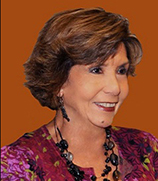
Mrs. Concepción 'Concha' Rivera
Concha Rivera was born and raised in Mexico. She and her family emigrated to the United States at the age of 20. She attended public schools in Mexico. She holds degrees in interior design, and AA in business, and an AA in fundraising from Loyola University.
At age 22, she married Tomás Rivera and had three children. After her husband’s death, Concha was acting director of the California Museum of Photography, and was responsible for moving the museum from the university campus to downtown Riverside. She continued with the museum for 12 years as Director of Development. She has served in numerous boards, such as the Riverside Art Museum, The Riverside Community Foundation, is the founder of the Tomás Rivera conference, and the founder of Primavera in the Gardens at UCR.
Concha serves on the UCR Foundation Board of Trustees and was also selected as the 2019 Woman of the Year by Assembly member Jose Media, 61st Assembly District. She enjoys traveling, having visited 63 countries (and continues to travel!), and enjoys ballroom dancing, reading, and playing tennis.
Her late husband Tomás Rivera was a Chicano author, poet, and educator. From 1979 until his death in 1984, he was the chancellor of the University of California, Riverside, the first Latino and minority to hold such a position within the University of California system.
Concha continues with the legacy left by her husband to campaign for education. Watch this Deeply Rooted Youtube video.
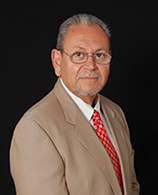
Dr. Gutiérrez, along with Cesar Chavez, Reies López Tijerina, and Corky Gonzales, stands out as among the most important and influential leaders of the Chicano movement of the late 1960s and early 1970s.
He was a founding member of the Mexican American Youth Organization (MAYO) in 1967, one of the first student activist groups of the Chicano movement; and founding member and past president of the political third-party La Raza Unida Party, which left its mark on the political scene, challenging Democratic and Republican parties alike to court the ignored Mexican American and Latino voter.
José Angel was one of many activists working to change public education on a local level in the 1960s and 70s. Born in Crystal City, Texas, and educated in local schools, Gutiérrez mobilized the community to demand equal treatment for Chicano students. He was lead organizer of the Winter Garden Project, the project that which led to the now famous walkout of 1969.
Dr. Gutiérrez has been organizer, founder and co-founder of several other organizations such as the Mexican American Unity Council (MAUC), Ciudadanos Unidos, Obreros Unidos Independientes, Becas Para Aztlán, Oregon Council for Hispanic Advancement, Northwest Voter Registration and Education Project, and Grupo de Apoyo para Immigrantes Latin Americanos (GAILA).
He has been the subject of many articles and film documentaries, including the PBS video series, CHICANO! The Mexican American Struggle for Civil Rights, and is mentioned in many Chicano history and political science books. He was also featured as an "Innovator" in the PBS documentary series - School: the Story of American Public Education. More recently Dr. Gutiérrez was featured in a segment of: “Prejudice and Pride: the Chicano Movement”, which was part of the PBS series - "Latino Americans."
We just received the news that José Angel Gutiérrez is the recipient of the prestigious 2019 Hispanic Hero Award. For those not familiar with his contributions, here's the video produced and published by the United States Hispanic Leadership Institute. Watch .
2020-22 Honorary Chair / Padrino de Honor
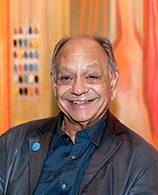
Cheech Marin
Best known as one half of the hilariously irreverent, satirical, counter-culture, no-holds-barred duo Cheech and Chong (now on tour), Cheech Marin is a paradox in the world of entertainment. Cheech is an actor, director, writer, musician, art collector, and humanitarian, a man who has enough talent, humor, and intelligence to do just about anything. He is truly a multi-generational star.
Cheech (real name Richard) Marin was born in South Central Los Angeles and met Tommy Chong in Vancouver, British Columbia as a political refugee. The duo moved back to Los Angeles and proved to be “entertainment gold.” Six of their albums went gold, four were nominated for Grammys, and Los Cochinos won the 1973 Grammy for Best Comedy Recording. The critically acclaimed duo made a fluid transition to films, starring in eight features together.
Cheech is recognized today as a preeminent Chicano art advocate. In the mid-1980s, he began developing what is now arguably the finest private collection of Chicano art. Much of it formed the core of his inaugural exhibition Chicano Visions: American Painters on the Verge, which broke attendance records during its groundbreaking 15‐city tour during 2001‐2007 to major art museums across the United States. He states, “Chicano art is American art. My goal is to bring the term ‘Chicano’ to the forefront of the art world.”
Following the success of Chicano Visions, over a dozen additional exhibitions drawn from the Cheech Marin Collection have toured more than 50 major art museums across the United States and in Europe under the direction of Melissa Richardson Banks. In addition, art books have been independently published to accompany many of these exhibitions, including Papel Chicano: Works on Paper from the Collection of Cheech Marin, Chicanitas: Small Paintings from the Cheech Marin Collection, and Papel Chicano Dos: Works on Paper from the Collection of Cheech Marin. Artwork from his collection inspires his work in other ways. For example, the bottle design of Tres Papalote Mezcal, for which Cheech serves as the brand ambassador, was inspired by the contemporary glass sculptures and other works of Einar and Jamex de la Torre, two brothers who are represented his collection.
Furthering his goal to introduce Chicano art to a wider audience, Marin has entered into a partnership with the City of Riverside and Riverside Art Museum to create the national Cheech Marin Center for Chicano Art, Culture, and Industry (aka “The Cheech”). Slated to open in 2021, The Cheech will become the permanent home for his more than 700 works of Chicano art, including paintings, sculptures, and photography; collectively, the most renowned Chicano art collection in the United States.
Cheech is a nationally ranked golfer, active in the charity circuit. Married to Russian-born classical pianist Natasha Marin, the couple resides in Pacific Palisades, California.
2023 Honorary Chairs / Madrina & Padrino de Honor
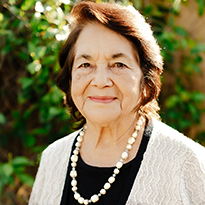
Dolores Huerta
Dolores Huerta is one of the most influential Chicana/Latinas of the 20th century for her work as a community organizer, labor activist, civil rights leader, and advocate for social, economic, and environmental justice.
Dolores Clara Fernández Huerta (born April 10, 1930) is an American labor leader and civil rights activist who, with Cesar Chavez, is a co-founder of the United Farmworkers Association, which later merged with the Agricultural Workers Organizing Committee to become the United Farm Workers (UFW). Huerta is the originator of the phrase "Sí, se puede".
Huerta's community activism began when she was a student at Stockton High School. Huerta was active in numerous school clubs and was a majorette and dedicated member of the Girl Scouts until the age of 18. A schoolteacher accused her of stealing another student's work and, as a result, giving her an unfair grade, an act she considers to be rooted in racial bias. Having experienced marginalization during childhood because she was Hispanic, Huerta grew up with the belief that society needed to be changed. She attended college at the University of the Pacific's Stockton College (later to become San Joaquin Delta Community College), where she earned a provisional teaching credential. After teaching elementary school, Huerta left her job and began her lifelong crusade to correct economic injustice.
In 1955, Huerta along with Fred Ross co-founded and organized the Stockton Chapter of the Community Service Organization (CSO), which fought for economic improvements for Latino/Mexican/Chicano migrant Farm workers. Due to her dedication and willingness to serve, Ross often delegated huge responsibilities to her. He knew she was capable of delivering the organization's message in Spanish and English and promoted the agenda from door to door field organizing. "As she assumed responsibilities and stance that were traditionally held by white males, Huerta encountered criticism based on both gender and ethnic stereotypes".
In 1960, Huerta co-founded the Agricultural Workers Association, which set up voter registration drives and pressed local governments for barrio improvements. In 1962, she co-founded, with César Chávez, the National Farm Workers Association, which would later become the United Agricultural Workers Organizing Committee. Huerta was the only woman to ever sit on the board of the UFW, until 2018.
As an advocate for farmworkers' rights, Huerta has been arrested twenty-two times for participating in non-violent civil disobedience activities and strikes. She remains active in progressive causes, and serves on the boards of People for the American Way, Consumer Federation of California, and Feminist Majority Foundation.
On June 5, 1968, Huerta stood beside Robert F. Kennedy on the speaker's platform at the Ambassador Hotel in Los Angeles as he delivered a victory statement to his political supporters shortly after winning the California Democratic presidential primary election. Only moments after the candidate finished his speech, Kennedy and five other people were wounded by gunfire inside the hotel's kitchen pantry. Kennedy died from his gunshot wounds on June 6.
Huerta is very familiar with our Theme. In September 1988, in front of the St. Francis Hotel in Union Square, Huerta was severely beaten by San Francisco Police officer Frank Achim during a peaceful and lawful protest of the policies/platform of then-candidate for president George H. W. Bush. The baton-beating caused significant internal injuries to her torso, resulting in several broken ribs and requiring the removal of her spleen in emergency surgery. The beating was caught on videotape and broadcast widely on local television news. Later, Huerta won a large judgment against the SFPD and the City of San Francisco for the attack, the proceeds of which she used for the benefit of farm workers. As a result of this assault and the suit, the SFPD was pressured to change its crowd control policies and its process of officer discipline.
Following a lengthy recovery, Huerta took a leave of absence from the union to focus on women's rights. Huerta is president of the Dolores Huerta Foundation, which she founded in 2002. It is a 501(c)(3) "community benefit organization that organizes at the grassroots level, engaging and developing natural leaders. DHF creates leadership opportunities for community organizing, leadership development, civic engagement, and policy advocacy in the following priority areas: health & environment, education & youth development, and economic development."
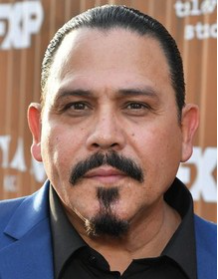
Emilio Rivera
Emilio was born in San Antonio, Texas as the oldest child of seven siblings (four brothers and three sisters), and as a young boy his family moved to California.
He is very familiar with our Theme as having grown up in a gang family from Frogtown (an impoverished neighborhood of Los Angeles, Elysian Valley).
Upon matriculating from high school in 1979 as still a youth, Emilio enlisted in the US Army. But after which Emilio set out on a path of self-destruction and recklessness. He was associated with street gangs, took drugs, and drank. He lived this life for years, then as he said, acting saved his life. He went into rehab and began studying acting, and although he wasn’t ready for Hollywood yet, Emilio launched his acting career as a stage actor. He first started honing his craft and improv skills on comedy club stages, but found discipline and true passion through the art of acting.
Underneath his exterior, Emilio's passion for acting thrived and after much soul searching he decided to take his biggest risk and pursue professional acting. The training, discipline and extensive hours of studying changed Emilio's life forever. Those around him were amazed at the radical yet positive change in Emilio and realized he had found his true passion in life. In between his time studying Emilio worked as a mechanical engineer.
He discovered that turning your life around is the key to making dreams come true. His acting credentials have allowed him to top the list of successful Latino actors.
With nearly 150 acting credits to his name, he is known for his authenticity and presence on screen, especially while depicting criminals and law enforcement officers. Emilio gained international fame for his portrayal of Marcus Álvarez (Leader of the Mayans Oakland charter) in the FX original crime-drama series Sons of Anarchy and its spin-off, Mayans M.C.
Noticeably, the fictional character of Marcus Álvarez is called "El Padrino" by his fellow Mayans, a title of immense respect, and a title that will now be bestowed upon Mr. Rivera in real-life by our LEAD Projects, as an example of life imitating art.
2024 Honorary Chair / Padrino de Honor
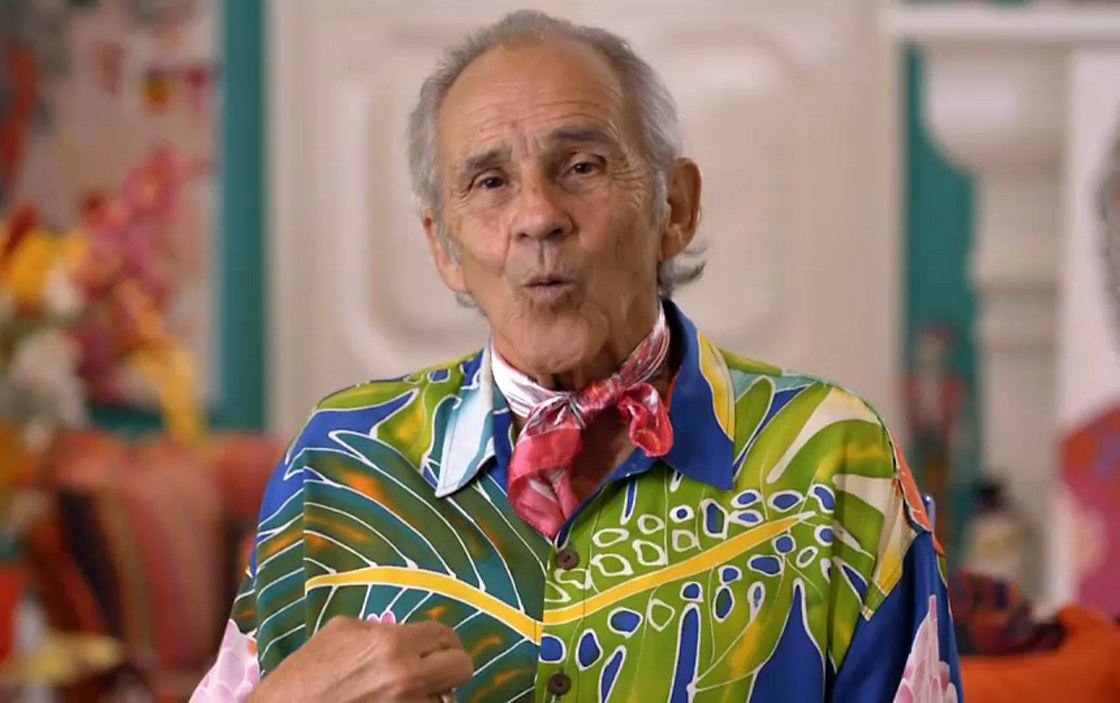
Pepe Serna
Actor, Motivator, Artist, Speaker, Writer, Producer. Director
Lea la versión en español - Padrinos Honorarios
Pepe Serna is your favorite actor, and you didn’t even know it. Did you grow up in the 1970s, ’80s, or ’90s? Are you a millennial or a Gen X? Doesn’t matter. When you went to the movies or turned on the TV, he was right there in front of you. No, not the star. The guy to his or her left. The one who makes the scene work and the star shine.
As one of the longest working character actors in Hollywood, Pepe Serna has inspired and paved the way for generations of Latino actors by defying stereotypes and fighting for representation in an industry that continues to largely ignore the Latino community.
Pepe Serna is a versatile American actor, artist, and motivational speaker, born on July 23, 1944, in Corpus Christi, Texas. With a career spanning over five decades, Serna has appeared in more than 100 films and 300 television shows. He is perhaps best known for his role as Angel Fernandez in the iconic film "Scarface" (1983), where his character met a gruesome end in a memorable scene.
Serna's early career included roles in films like "The Student Nurses" (1970) and "The New Centurions" (1972). He has also played significant roles in movies such as "Silverado" (1985), "The Rookie" (1990), and "American Me" (1992). His television credits are extensive, featuring appearances in shows like "The Rockford Files," "Knight Rider," and "American Playhouse."
More than an actor, Serna is also known for his work as an artist and a motivational speaker. He has conducted workshops and given keynote speeches, emphasizing the power of self-expression and cultural heritage. His documentary, "Pepe Serna: Life is Art," highlights his contributions to Hollywood and the representation of Latino actors in the industry. This documentary is available on streaming platforms like Amazon and Apple TV.
In addition to his film and television work, Serna has been active in theater and voice acting, showcasing his wide-ranging talents and enduring presence in the entertainment industry.
Now, in his 80s, Serna is determined to help solve Hollywood’s representation problem by empowering students in under-resourced communities to become the next generation of storytellers. “We’re so much more than anybody gives us credit for,” he said. “We’re good at anything and everything. And that’s why it’s important that I reach as many students as I can in my workshops.”
For more detailed information, you can visit his official website.
- Prime Video: Pepe Serna Life is Art
- Apple TV: Pepe Serna Life is Art
- Book: Pepe Serna Life is Art
PS: Pepe encourages everyone to also go to YouTube and watch, Raices De Sangre, he says is “The Greatest Chicano and Mexican Movie ever made, shot in 1977.”